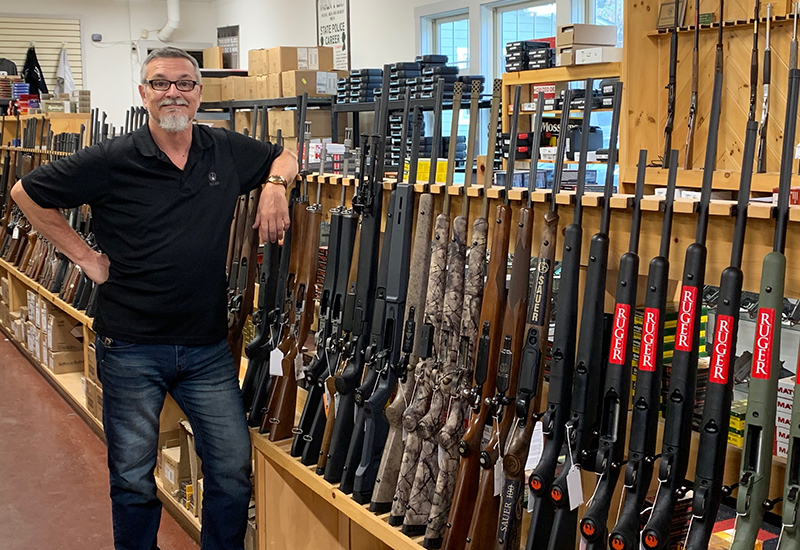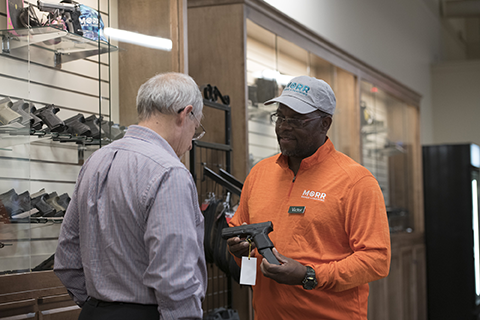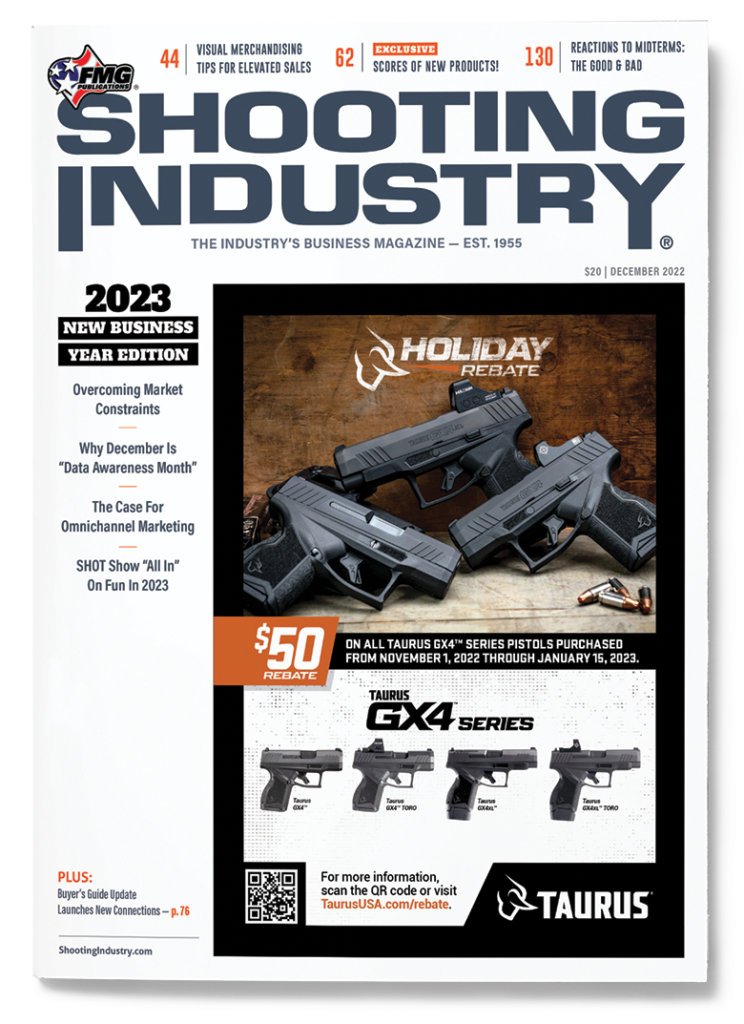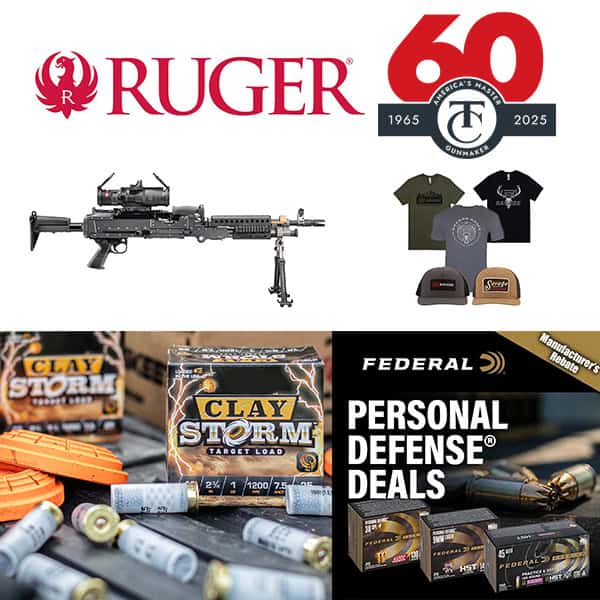10 Tips To Make Your Next ATF Inspection Better
Having ATF Industry Operations Investigators (IOIs) walk through the door can make even the most stalwart of gun dealers weak in the knees. It’s especially true now, when the overall approach of the agency is increasingly punitive.
Wally Nelson, a retired ATF deputy assistant director, is now an NSSF compliance consultant. Perhaps surprisingly, he contends ATF inspections themselves haven’t changed significantly.
“What is different, however, is the Biden administration imposed a requirement to recommend the revocation of an FFL for a single violation of certain types if deemed ‘willful’ — such as the failure to conduct a background check,” he stated. “ATF cannot revoke a license unless there’s some evidence of willfulness.”
Factors Leading To More Frequent Inspections
According to Nelson, several categories of gun dealers are more likely to be inspected than the average retailer. One of those categories is dealers who were inspected one to two years ago and either received a warning letter or attended a warning conference with ATF. If you’ve had either one in the past couple of years, you should expect to be inspected again in the near term, and you need to be ready.
Retailers who report multiple thefts and losses — including thefts from their business — also may be inspected more often than average.
“An inspection can help assess why this is happening and what can be done to make it not happen so much,” Nelson said. “Your records would be inspected at the same time.”
Dealers who have large numbers of traces may be inspected more often than an FFL who has never had a trace.
“Generally, those FFLs are very large dealers who have been in business a long time, and the more firearms you sell and the longer you sell them, the more traces you have,” Nelson explained. “Because of their size, they’ll probably be inspected more often than someone who has never had a trace or never reported a multiple handgun sale or who is very small.”
ATF rarely gives advanced notice they’re coming to audit you, so be prepared for an inspection at any given time. This means being proactive about having everything in order for an audit at a moment’s notice — because it’s how it happens in most cases.
As the FFL holder, what happens in your shop is ultimately your responsibility.
1. Take Inventory
The number-one thing you can do to be ready for an inspection is to take inventory of your firearms, at least quarterly. This means a 100% inventory where you hold the gun in your hand and look at the serial number on the frame and verify it against your records, because this is exactly what ATF will do.
Taking this level of inventory allows you to find any missing firearms before ATF finds them for you. Whether someone forgot to log out a firearm or one is just missing (and you can’t account for it), you can take the necessary steps to either correct your records or file a Form 3310.11 (FFL Theft/Loss Report) that goes to ATF and local law enforcement.
In between the times you take full inventory, crosscheck your A&D report with what’s in your store.
“There will be a count in your bound book,” said Miles Hall, senior advisor for Hall-N-Hall Consulting. “Verify the count is accurate. If your book says you brought in 1,000 guns and you sold 900 guns, you should have 100 guns leftover. Do a check and be sure you have 100 guns. Do it once a month.”
2. Verify Brand Inventory
“Randomly verify you have all the guns in a certain brand,” Hall advised.
Have a list of everything you have in the brand and go through and check just those guns to be sure they’re all accounted for.
“If you go through and find a gun missing, you must report it to ATF immediately,” he said. “Also, if you find the serial number on a gun is different from the serial number on the box, you have to fill out an ATF form that says the box is in error.”
On some “kit gun” long guns, Hall said, you may find multiple serial numbers.
“The only serial number that counts is the one on the frame,” he noted.
3. Have A Process For Background Checks
One place many retailers get into trouble is doing background checks. Errors can creep in in a number of ways and having a consistent review process for background checks can greatly reduce those errors. Be sure all questions are answered correctly, the signature and date are on the correct line and all permits are up to date and current. Part of the process should include two or three different people reviewing each 4473 for errors before you actually run the background check.
“One thing that can get you in trouble on a background check is when you take a gun in on consignment to sell,” Nelson remarked. “If it doesn’t sell and you transfer the gun back, you have to do a 4473 and a NICS check. If you fail to do this and just give them their gun back, you will be putting yourself in jeopardy of license revocation. The one exception to this is the return of a repaired gun to the person who brought it in. It does not require a NICS check.”
Consignment is not only taking in a gun to sell, it’s also storing a gun at a gun shop for a period of time, and it includes delivering a gun to an FFL for appraisal. When you do so, you must complete a 4473 and have a NICS check before you return it to the owner.
4. Record Guns Coming In For Repair
If your store has a gunsmithing operation, Hall recommends treating it as its own department to keep inspections simple.
“When we had our store, we had a separate set of books for the gunsmithing department,” Hall recalled. “We also did inspections in that department.”
Even if a gun comes in that won’t shoot (and will never again), put it in the book.
“You have to make sure you’re accounting for all of them,” Hall emphasized.
5. Tag All Personal Guns
Dealers and their employees may have personal guns in the store for a variety of reasons.
“Make sure all personal guns are tagged as such,” Hall counseled. “I’m not talking about the gun you’re physically carrying; I mean any other guns you have at the store.”
Have a way to clearly identify those guns so when ATF does an inspection, they know why they are not in the A&D record.
6. Fill Out Multiple Handgun Reports
An ATF Form 3310.4 (Report of Multiple Sale or Other Disposition of Pistols or Revolvers) must be filed with ATF and local law enforcement by FFLs when they sell two or more handguns on the same day or within five consecutive business days the store is open to the same person.
The report is due the day the sale occurs. If Joe Customer purchases one handgun from you on Monday and another one from an employee on Thursday, you may miss the fact he’s purchased two handguns in a five-day period unless you have a process in place for checking it. Whether you have software that tracks sales or you have a paper system, you must have one to catch multiple handgun sales. Failure to file a Form 3310.4 is regarded as a serious violation.
7. Be Alert For Straw Purchases
A straw purchase is when someone comes in and purports to be the actual buyer of a firearm when they’re buying it on behalf of someone else who doesn’t want to be known to the dealer. This doesn’t have to be a criminal; it can be anyone.
According to Nelson, the most common straw purchase is when a sale is denied and someone else comes to the shop in the near term and says, “I want that gun right there,” with no haggling, shopping or questioning the price.
“I recommend to dealers when you have a denied firearm — unless you’re a very big dealer and you have 10 of the same model out on the floor — take it to the back and put it under quarantine for a week or so because it’s very common for someone else to come and try to buy that firearm on behalf of the person who was denied,” he observed.
Tell your employees to say “no” to a sale they aren’t comfortable about.
“If something doesn’t feel right — if something in their gut says this is not right — let them stop it and not make the sale,” Nelson suggested. “Empower them to shut down the sale.”
8. Review Your Sales Once A Week
Taking time each week to review recent transactions involving firearms will save you in the long run, Hall noted.
“Once a week, you need to inspect all the gun sales from the previous week,” he said. “Look at every page and every item. If you find something wrong or in error, get it fixed. If you accidentally sold a gun to someone you shouldn’t have, tell them to bring the gun in and get a full refund; get the gun back. Do whatever you have to do to minimize the long-term damage.”
For a really big operation, you may have to review gun sales more frequently than once a week, according to Hall, but for most stores once a week is enough.
9. Keep Training
There’s the adage “always be training” — and it certainly applies here.
“Train your staff all the time,” Hall implored. “Once a month, do a review of Form 4473 and the process to log in and log out a firearm. This should be a regular part of what you do.”
10. Be Present
Above all, simply “being present” can relieve future stressors.
“If you own a gun shop, don’t be an absentee owner,” Nelson instructed. “Be there. Be present. Understand what’s happening in your shop. Check on your employees to be sure they’re doing what they’re supposed to do. Make sure they’re double checking or triple checking 4473s so you always catch any errors.”
As the FFL holder, what happens in your shop is ultimately your responsibility.
“If you aren’t there and you don’t know what’s going on, you can get into trouble because you’re the responsible person,” Nelson concluded.








